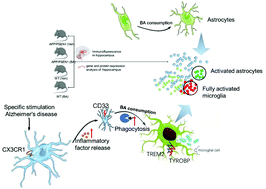当前位置:
X-MOL 学术
›
Food Funct.
›
论文详情
Our official English website, www.x-mol.net, welcomes your
feedback! (Note: you will need to create a separate account there.)
Bilberry anthocyanins improve neuroinflammation and cognitive dysfunction in APP/PSEN1 mice via the CD33/TREM2/TYROBP signaling pathway in microglia.
Food & Function ( IF 5.1 ) Pub Date : 2020-01-31 , DOI: 10.1039/c9fo02103e Jing Li 1 , Runtian Zhao , Yuhan Jiang , Yi Xu , Huan Zhao , Xiaoling Lyu , Tao Wu
Food & Function ( IF 5.1 ) Pub Date : 2020-01-31 , DOI: 10.1039/c9fo02103e Jing Li 1 , Runtian Zhao , Yuhan Jiang , Yi Xu , Huan Zhao , Xiaoling Lyu , Tao Wu
Affiliation

|
Alzheimer's disease, characterized by neuroinflammation and beta-amyloid protein plaques, is a memory-threatening neurodegenerative disease with no effective treatment. Here, the effect of bilberry anthocyanins (BA) on cognitive functions was evaluated using APP/PSEN1 transgenic Alzheimer's disease model mice and their WT littermates. Our results revealed that BA appreciably improves learning and memory abilities and reverses defects to cognitive functions in APP/PSEN1 mice. Furthermore, BA reverses brain, liver and kidney damage caused by Alzheimer's disease, with no significant changes in oxidative stress and lipid metabolism-related indicators. In addition, BA decreases serum and brain lipopolysaccharide (LPS) levels and increases fecal short-chain fatty acid content. Immunofluorescence and RT-PCR analysis results showed that BA fully activates the microglia and astrocytes, downregulates the expression of inflammatory factors (TNF-α, NF-Kβ, IL-1β, IL-6, COX-2, iNOS and CD33) and chemokine receptor CX3CR1, and upregulates the expression of microglia homeostatic factors (TREM2 and TYROBP) and Toll-like receptors (TLR2 and TLR4). Moreover, western blot analysis revealed that BA significantly upregulates the expression of synaptic and phagocytotic function-related proteins (CD68, synaptophysin and IRF7) in APP/PSEN1 mice. Altogether, we show for the first time that BA consumption reverses Alzheimer's disease-induced cognitive disfunction, decreases hippocampal neuroinflammatory responses, and induces phagocytosis of microglia to beta-amyloid protein plaques by regulating the CD33/TREM2/TYROBP signaling pathway in microglia.
中文翻译:

越桔花色苷通过小胶质细胞中的CD33 / TREM2 / TYROBP信号通路改善APP / PSEN1小鼠的神经炎症和认知功能障碍。
以神经发炎和β-淀粉样蛋白斑块为特征的阿尔茨海默氏病是威胁记忆的神经退行性疾病,没有有效的治疗方法。在这里,使用APP / PSEN1转基因阿尔茨海默氏病模型小鼠及其野生同窝小鼠评估了越橘花色苷(BA)对认知功能的影响。我们的结果表明,BA可以显着提高学习和记忆能力,并可以逆转APP / PSEN1小鼠的认知功能缺陷。此外,BA可逆转由阿尔茨海默氏病引起的脑,肝和肾损害,而氧化应激和脂质代谢相关指标没有明显变化。此外,BA可降低血清和脑脂多糖(LPS)的水平,并增加粪便短链脂肪酸的含量。免疫荧光和RT-PCR分析结果表明BA完全激活小胶质细胞和星形胶质细胞,下调炎症因子(TNF-α,NF-Kβ,IL-1β,IL-6,COX-2,iNOS和CD33)和趋化因子的表达受体CX3CR1,并上调小胶质细胞稳态因子(TREM2和TYROBP)和Toll样受体(TLR2和TLR4)的表达。此外,蛋白质印迹分析显示,BA显着上调APP / PSEN1小鼠中与突触和吞噬功能相关的蛋白(CD68,突触素和IRF7)的表达。总而言之,我们首次证明了BA的摄入可以逆转阿尔茨海默氏病引起的认知障碍,减少海马神经炎症反应,
更新日期:2020-02-26
中文翻译:

越桔花色苷通过小胶质细胞中的CD33 / TREM2 / TYROBP信号通路改善APP / PSEN1小鼠的神经炎症和认知功能障碍。
以神经发炎和β-淀粉样蛋白斑块为特征的阿尔茨海默氏病是威胁记忆的神经退行性疾病,没有有效的治疗方法。在这里,使用APP / PSEN1转基因阿尔茨海默氏病模型小鼠及其野生同窝小鼠评估了越橘花色苷(BA)对认知功能的影响。我们的结果表明,BA可以显着提高学习和记忆能力,并可以逆转APP / PSEN1小鼠的认知功能缺陷。此外,BA可逆转由阿尔茨海默氏病引起的脑,肝和肾损害,而氧化应激和脂质代谢相关指标没有明显变化。此外,BA可降低血清和脑脂多糖(LPS)的水平,并增加粪便短链脂肪酸的含量。免疫荧光和RT-PCR分析结果表明BA完全激活小胶质细胞和星形胶质细胞,下调炎症因子(TNF-α,NF-Kβ,IL-1β,IL-6,COX-2,iNOS和CD33)和趋化因子的表达受体CX3CR1,并上调小胶质细胞稳态因子(TREM2和TYROBP)和Toll样受体(TLR2和TLR4)的表达。此外,蛋白质印迹分析显示,BA显着上调APP / PSEN1小鼠中与突触和吞噬功能相关的蛋白(CD68,突触素和IRF7)的表达。总而言之,我们首次证明了BA的摄入可以逆转阿尔茨海默氏病引起的认知障碍,减少海马神经炎症反应,











































 京公网安备 11010802027423号
京公网安备 11010802027423号